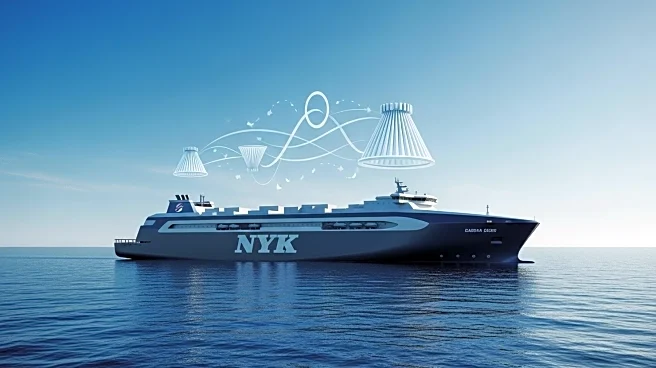What's Happening?
Nippon Yusen Kabushiki Kaisha (NYK), a major player in the international shipping industry, has made a significant move towards reducing its carbon footprint by purchasing carbon dioxide removal credits. These credits are facilitated by 1PointFive's Direct Air Capture (DAC) technology. This marks NYK's second acquisition of such credits from 1PointFive, aimed at mitigating the company's residual operational emissions. The international shipping industry is responsible for approximately one billion tons of CO2 emissions annually. NYK's initiative is part of a broader strategy to address the 10% of emissions that remain after operational reductions, which translates to a need for removing 100 million tons of CO2 each year. Akira Kono, NYK's Representative Director and Executive Vice-President, emphasized the company's commitment to decarbonization through various measures, including the adoption of fuel-efficient vessels and low-carbon fuels.
Why It's Important?
The purchase of carbon dioxide removal credits by NYK underscores the growing importance of sustainable practices in the shipping industry, which is a significant contributor to global CO2 emissions. By investing in DAC technology, NYK is not only addressing its own emissions but also setting a precedent for other companies in the sector. This move could potentially accelerate the adoption of similar technologies across the industry, leading to a substantial reduction in global emissions. The initiative also highlights the role of innovative technologies like DAC in achieving decarbonization goals, which is crucial for meeting international climate targets. Stakeholders in the shipping industry, including regulators and environmental groups, may view this as a positive step towards more sustainable maritime operations.
What's Next?
NYK's collaboration with 1PointFive is expected to continue as the DAC facility in Texas, known as STRATOS, is set to become operational this year. This facility will produce the carbon dioxide removal credits that NYK has purchased. As the shipping industry faces increasing pressure to reduce its environmental impact, other companies may follow NYK's lead in adopting carbon capture technologies. The success of this initiative could influence regulatory frameworks and encourage further investment in carbon management solutions. Additionally, the development of DAC technology may spur advancements in other sectors seeking to reduce their carbon footprints.
Beyond the Headlines
The adoption of Direct Air Capture technology by NYK raises important questions about the scalability and economic viability of such solutions in the long term. While DAC offers a promising method for carbon removal, its widespread implementation will require significant investment and technological advancements. Moreover, the ethical implications of relying on carbon credits as a means to offset emissions, rather than reducing them at the source, may be a topic of debate among environmentalists and policymakers. The success of NYK's initiative could influence public perception and policy decisions regarding the role of carbon capture in achieving climate goals.










